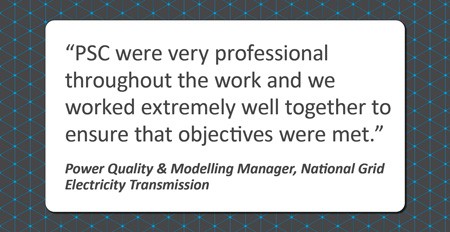
Overview
National Grid is an energy company operating in the UK and the US delivering electricity and gas to its customers and communities focusing on decarbonizing the energy system. This project for National Grid Electricity Transmission (NGET) relates to the electricity transmission network throughout England and Wales to make sure electricity reaches homes and businesses safely, reliably and efficiently.
Challenge
In Great Britain (GB) the existing harmonic compliance management of the electricity system rests with the respective network owner/operator. It’s managed within the philosophy that the “polluter is responsible for the cleanup.” While this approach has served the industry for a considerable time, a fast change is taking place where more and more synchronous generation is being replaced by power electronics‑based renewables. Added to this is the introduction of more low carbon technologies typically being powered by electronics-controlled devices. Attempts to manage harmonic compliance by assigning various levels of responsibility to parties can work to a certain level but in a fast-changing environment it’s best to optimize the approach. Hence, National Grid engaged PSC to investigate other approaches to managing harmonic distortion and compliance that might deliver a more coordinated and cost-effective solution.

Solution
PSC reviewed global best practices and experiences in managing harmonic compliance from the owner and developer perspectives. This analysis led to the development of four potential options for the responsibility of Harmonic Compliance Management.
- Status Quo
- Utility Takes Responsibility
- Utility and Connectee Share Responsibility
- Connectee Takes Responsibility
These four proposed options were presented to the broader industry through several stakeholder engagement activities and developed in more detail. Based on this feedback, the “Utility Takes Responsibility” option was deemed preferable and able to deliver the following key benefits:
- Utilities have full knowledge of their system, upcoming connections and overall system management. Therefore, they can optimize the location, size and timing of any harmonic mitigation solutions to solve multiple issues.
- In some situations, breaches in harmonic limits can be due to low-probability network events and could be managed through more active operation measures.
- The utility can assess the risks associated with these network events and engage with an ancillary service market rather than installing traditional harmonic filtering solutions.
- The risks and potential delays to new connections can be reduced as the requirement for harmonic mitigation is no longer a limiting factor for the new connectee.
- Consumers can benefit from an overall cost saving due to a reduction in the number of harmonic filters installed on the system.
PSC developed this concept further and evaluated other requirements around harmonic compliance management covering existing arrangements, established understanding of consumer benefits, funding arrangements, mechanisms to maintain proper level of incentives for customers, code modification to facilitate any suggested national policy changes, and stakeholder engagement.
PSC Advantage
PSC are leading experts in power quality and have advised many global distribution and transmission system operators on the best approach to handling harmonic distortion. This global reach and experience allow PSC to provide an independent view to the different approaches being adopted by various regulatory models. PSC’s experience of carrying out the analysis on behalf of system operators, owners and new developers connecting to distribution and transmission networks, ensured PSC could consider all stakeholders’ needs when investigating the best overall harmonic compliance management solution.
“PSC were very professional throughout the work and we worked extremely well together to ensure that objectives were met. The work delivered was of high quality and led to our improved understanding of what’s happening elsewhere in the world. In the end, we were satisfied as a client with the service we got from PSC.”
